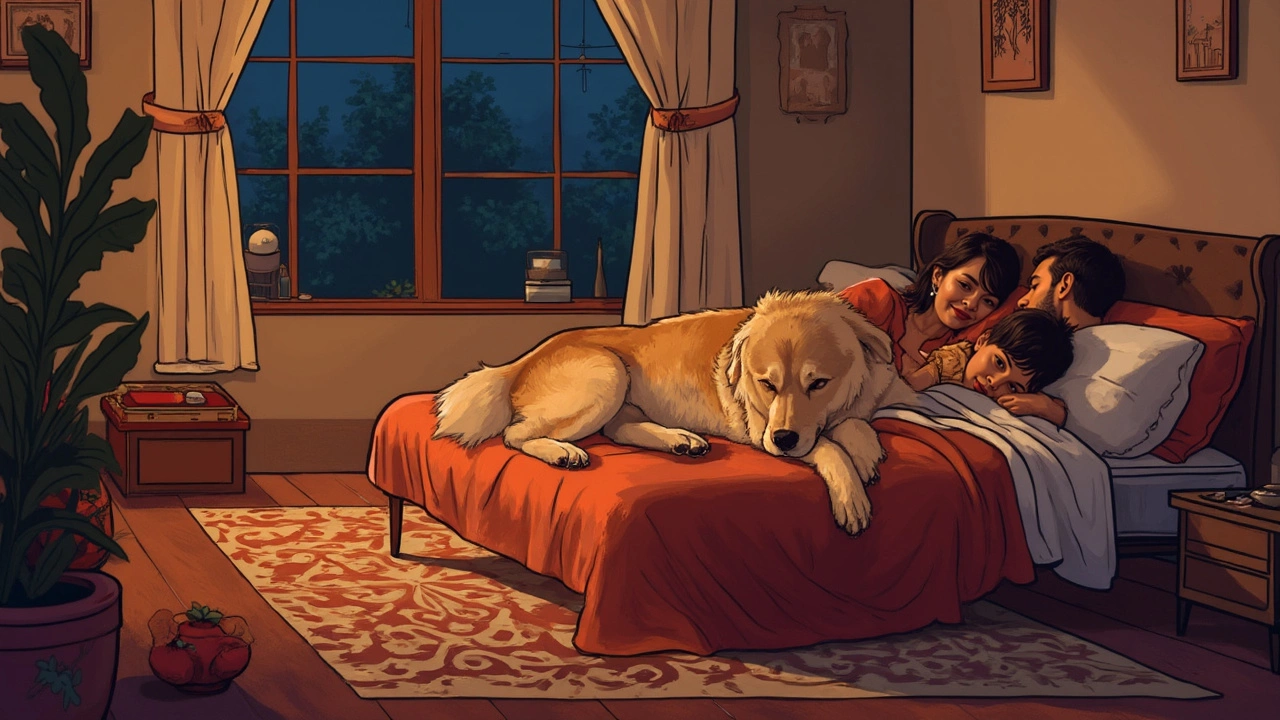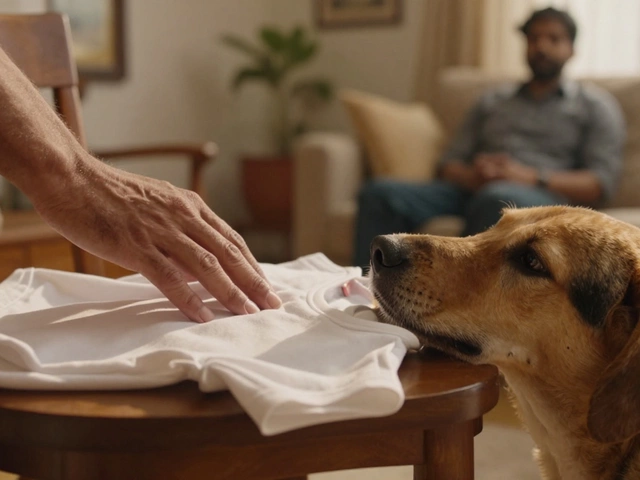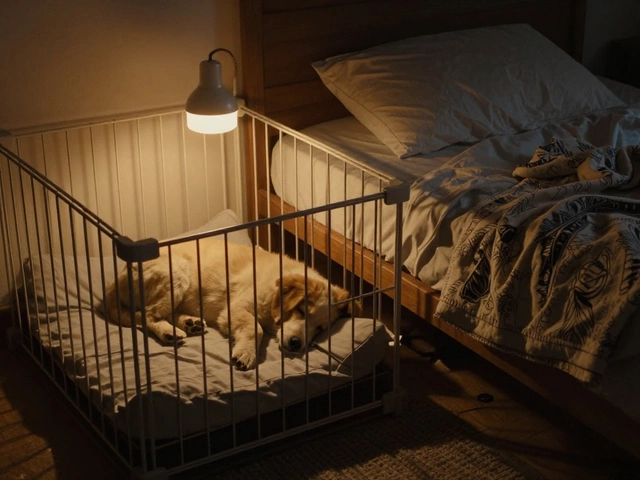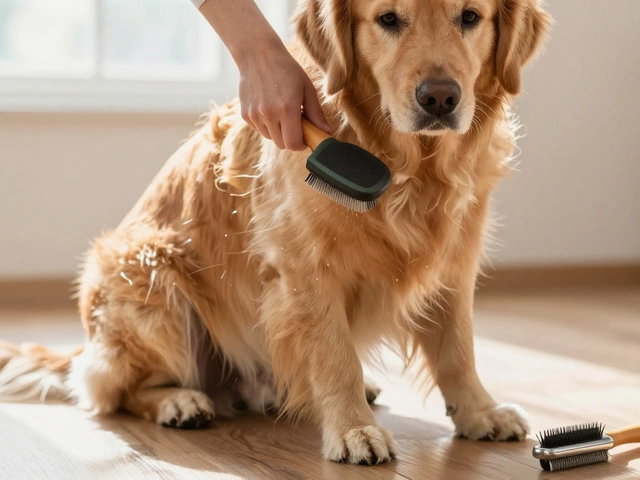
Ever caught your dog glancing at you while you're trying to get comfy in bed? You might be wondering if there's more to it than them just seeking a warm spot. Dogs, being naturally inclined to pack behavior, often choose their sleeping companions based on how they perceive the 'alpha' presence in their household. It's about security, warmth, and those all-important instincts.
So, what’s the deal with this alpha stuff anyway? Dogs descended from wolves, thrive on social hierarchy—and typically follow the leader or the most confident figure. This doesn't mean just the toughest person in the house; it could be the one feeding them or the person who's around the most.
The Pack Mentality
Dogs aren’t just our furry friends; they’re also little members of what they see as a modern pack. This pack mentality is deeply embedded in their instincts, and it shapes much of their behavior, including their tendency to sleep with what they perceive as the 'alpha' in the home.
Originally descending from wolves, dogs thrive in a social structure. In a pack, each member has a role, and the alpha is the leader that others look up to and rely on for protection. At home, this translates to the person who’s often confident, provides care, and offers security and guidance. It’s not always about strength; a consistent and loving presence often suffices.
Interestingly, dogs often choose to follow the alpha human around the house and may display 'shadowing' behavior by sticking close to them throughout the day. This close bond affects their sleep choices, too, as they opt to snooze where they feel safest—typically by their trusted human's side.
It's not just about feeling safe; sleeping with their pack, or you, reinforces the bond they have and establishes their place within the family unit. So when your dog snuggles up at night, it's more than just seeking warmth—it's a belief that you're their pack leader, the keeper of the den.
Choosing the Sleeping Spot
When your furry friend decides where to crash at night, a mix of habitual behavior, comfort, and a strong bond come into play. Understanding why they snuggle up where they do is a peek into their complicated inner world.
Your dog usually picks their sleeping spot based on dog behavior and preference for warmth and security. They might gravitate towards the alpha human for pure comfort and pack safety. If you regularly find them beside you, there’s a good chance they've chosen you as their main cuddle buddy. But don’t feel left out if it’s someone else; it could be as simple as another family member having the cozier blanket!
Now, if you're curious about how accurate this selection really is, there's interesting data out there. A pet behavior study showed that nearly 60% of dog owners reported their dogs prefer human beds over dog beds. Why? Because dogs love those familiar scents and the warm feeling they get next to you.
Here's a quick breakdown of key factors influencing their decision:
- Comfort: Many dogs seek out the softest and warmest spot available, which often means your bed.
- Bond: Sleeping together is a bonding experience, strengthening the connection between you and your dog.
- Security: In a pack, proximity to an alpha means protection. This instinct drives their desire to sleep close.
Understanding these behaviors can help you create the perfect snooze environment for your four-legged friend, whether it's beside you or on their own special dog beds.

Benefits of Sleeping with Dogs
Thinking about letting your dog share your bed? It turns out there are some pretty cool perks you might not have considered. For starters, dogs are like natural heaters. On chilly nights, they can provide warmth just by being there by your side, kind of like a living hot water bottle. Cozy, right?
Well, aside from the snuggles, having your furry friend beside you can actually boost your mood. Studies have shown that petting dogs can increase levels of oxytocin, the 'feel good' hormone. Imagine drifting off to sleep while feeling all relaxed and content just because your dog's there.
But that's not all. There's also a sense of security that comes from knowing your dog is nearby. Some dog owners report feeling safer, especially those living alone. Dogs often alert us to any sounds or movements, giving an extra layer of peace at night.
And let's not forget the bond factor. Sharing a bed can strengthen the connection you have with your dog. It cements the 'pack' mentality, making dogs feel included and loved. This isn’t just about showing who’s boss but about companionship and loyalty.
On the flip side, while it might be tempting to let them snooze with us every night, it's also important to consider allergies or if your dog's sleep habits could disrupt yours. Weighing the pros and cons can help decide what's best for both you and your furry pal.
Managing Sleep Habits
Want to make sure your furry pal isn't hogging the bed all night long? Managing your dog's sleep habits effectively can lead to better nights for both of you. First things first: consistency is key. Dogs are creatures of habit, and having a regular sleeping schedule can make a difference. That's right—just like human babies, dogs thrive with a bit of routine.
Start by deciding where you want your dog to sleep, and stick to it. If their own bed is the goal, encourage them nightly with treats or toys. Make their bed comfy with soft bedding, and always keep it in the same spot. Trust us, consistency works like a charm.
If your dog loves your bed, you aren’t alone. Let's face it, having them close is nice, but boundaries can help. Consider sectioning off a part of your bed with a blanket or pillow specifically for them. This way, they get the snuggle they crave without claiming the whole space.
Training can also help. Use commands like "bedtime" or "go to bed" to reinforce where they should sleep. Reward them with a treat every time they listen. Over time, they’ll get the message that their bed equals positive vibes.
If you’re dealing with a persistent bed-hogger, try gradually increasing the time they spend on their own bed. Start with short intervals and gradually extend them. Persistence pays off, promise!
Remember, some dogs might have their preferences due to health issues or anxiety. If they're having trouble adjusting, it might be a good idea to talk to a vet or a pet behaviorist. After all, happy pup, happy life!



